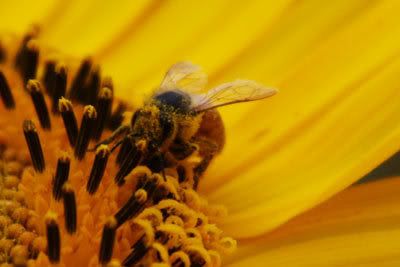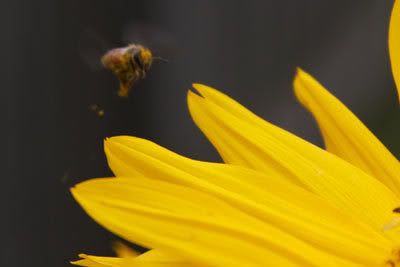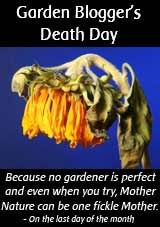
Professor Gretchen LeBuhn, a San Francisco State University biology professor, is signing up citizen researchers for the Great Sunflower Project, a program in the United States and Canada that aims to assess the health of bee populations, some of which are collapsing. Volunteers agree to plant one of bees' favorite flowers, namely sunflowers, and record how often the bees visit.
Bees are a lot more important to the welfare of our planet than many people realize. No bees means no pollenization, which means the disappearance of certain plant species, which in turn means the disappearance of certain animal species. And if we're all connected…what does that mean for us? It turns out that the reason for the disappearance of many bee species is complicated, but it can't be argued that man has a huge hand in the decline of the bees - specifically all of the pesticides we use to kill the bad bugs that have done a number on the good bugs as well. Plus there's global warming and the eradication of a lot of natural areas due to building that hasn’t helped either.

But enough about my soapbox and more about the project. If you're a gardener you owe it to the little pollinating bees to sign up with the Great Sunflower Project online. Just go to www.greatsunflower.org/ and sign up. It's completely free and they'll even send you a packet of sunflower seeds to get you started. Once you sign up you fill out an online form all about your garden. It's quite detailed and you'll need to say what part of the country you live in, what type of area you live in, what size your garden is, etc. Then there is a form to record the comings and goings of the bees that visit your sunflowers along with a detailed how-to sheet for participants.
If you're not a gardener, but you have some big pots and a sunny spot, you've got what it takes to plant some sunflowers. They'll grow like mad this summer and you'll have something pretty to look at and you're doing your part to help with the Great Sunflower Project.
If you're interested in the decline of bees you can find a lot of information online. You'll find out pretty quickly that it's a worldwide problem with websites from almost every country abuzz with information about declining bees. Here are some articles from a French website, an Australian website and an English website, all of which are pretty darned depressing if you ask me. It's no secret that I'm a bit of a tree hugger when it comes down to it, so hearing about the decline of a species, especially one this important, just makes me sad.
I think all of us owe it to the bees to take part in this project and see if we can help researchers shed some light on what is happening with bees across the United States. If I can grow sunflowers and attract bees, anyone can!




















7 comments:
Hi, Kate. Just a note to tell you that I heard/read somewhere that the only bees that haven't been affected by the bee blight are the ones who polinate and grow on organic farms!! Their populations are fine. Think it was a Martha show when she was talking about her bees. Anyway, I will certainly investigate the "Great Sunflower Project" and hope it isn't too late to start some sunflowers. Take care. K (aka Mad Beach Maven)
You'll think I'm making this up, but just a few minutes ago (before I read your post) I wrote "sunflower seeds" on my list of things to buy & do. I can't wait to check out the Great Sunflower Project and teach my 7 year old grandson about the bees. His parents can explain the Birds AND the Bees. Great post.
Awesome! Every year I plant a "sunflower fort" for the kids with the Mammoth Sunflowers. We have tons of bees in the entire garden, but I especially love that as soon as they bloom, the leafhoppers leave my tomato plants and rush to the sunflowers instead! Will be visiting that site to sign up in the a.m.!
I got my Lemon Queen sunflower seeds from them about a month ago. Sadly most of them were crushed in transit. A few were viable. So right now I have two little seedlings. I hope they make it. I'll be looking forward to counting my bees.
This is a great idea! Good for the kids too.
Great post. I am actually growing sunflowers this year in my whiskey barrels (amongst other things) and also have some clover seed to put down in the lawn for the bees if hubby ever gets to it. Bees ARE important, thank-you for educating us all some more on this important topic, I will check out the G.S.P. and maybe even link it on my blog for my 3 readers. ;) Must investigate how much bee watching is required to sign up......
Just an update....I signed up but won't be getting the seeds until 2010 so I will have to look for some Lemon Queen locally or just observe with the variety I have. Thanks for another great project idea Kate, I just remembered I ordered 2 books about bees from the school book club!
Post a Comment